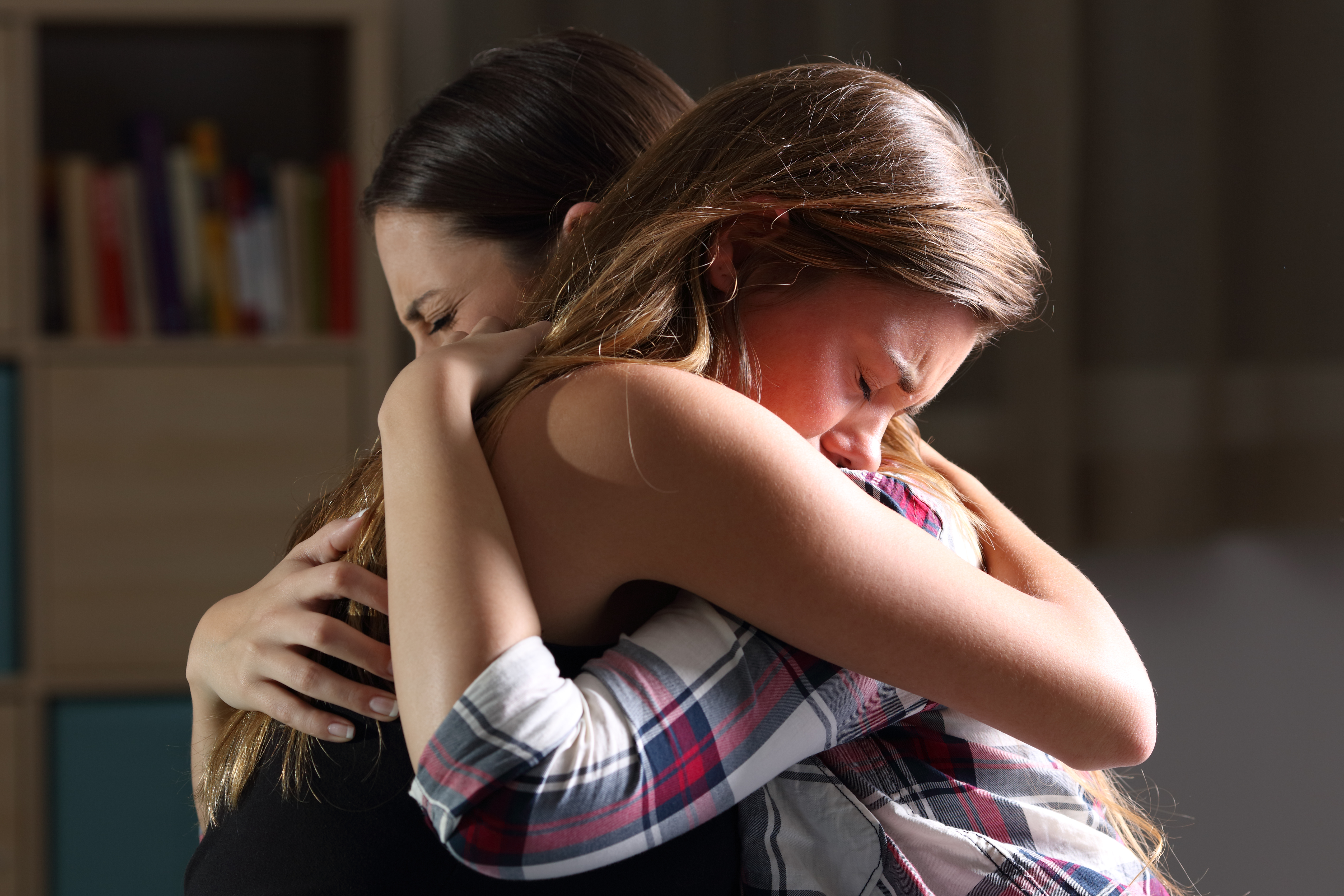Of all the pains that life can hand us, arguably the most searing is the death of a child. A parent’s world irrevocably and horrifically changes forever, no matter what the circumstances or the age of the child.
In what seems to be a manner contrary to the natural order, parents not only have a physical and emotional part of themselves ripped away, but also have the loss of all of the hopes, dreams, and aspirations they had so completely invested in their child.
With this loss, a parent’s world radically and dramatically changes forever. Most friends, relatives, and acquaintances do not know how to approach or console for fear of offending or upsetting the parent. Many parents say they begin to feel that they are treated as if they have a contagious disease. In an attempt to seem normal, or “over it,” emotions are suppressed and the parent begins to withdraw or become distant. This reaction, however, compounds the all-encompassing feeling of being totally alone.
Many well-intentioned attempts have been made to assist parents in recovering emotionally from their loss, including psychotherapy and various support groups. However, in an attempt to be all inclusive and “politically correct,” the spiritual perspective of the grieving process—or even the existence of God—is usually lacking (or actively avoided) in many of these approaches.
It was the personal experience of my own family and this deep need for spirituality that led to what is now known as the Emmaus Ministry for Grieving Parents.
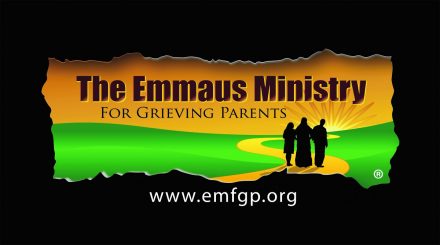
Thanksgiving evening of 2002, a healthy, ambitious and successful young US Air Force Captain, Paul Monaghan, took his own life, without any explanation or warning signs. As unexpected as a lightning strike on a clear blue day, Paul’s death shattered our idyllic, comfortable family life forever.
For five years afterwards, when she wasn’t numb, my wife, Diane, frantically searched. Searched for answers from her son’s wife on what actually happened. Searched for answers from his friends on what he was like leading up to his death. Searched for answers from Air Force investigators, who took an entire year to file their death report. Searched for answers not so much to the question of “why” as to “how”. How could her beautiful son do this to himself? How could he do this to the family he loved so much? She frantically searched for understanding, read an entire library of books on the death of a child and suicide, went to psychiatrists, psychologists, and psychotherapists, joined support groups and journaled. Nothing helped at all.
During these years, she prayed for two things: the strength to get out of bed in the morning and an understanding of how she could make some good come from such a horrific tragedy, but her prayers seemingly went unanswered. She felt God was not listening. During this time, she says, she received some strength from her faith, but not much comfort.
Then one day, everything changed. Undoubtedly, it was the Holy Spirit that prompted her to attend a totally unrelated program that eventually led to a deep relationship with a compassionate religious sister, who was a Spiritual Director. They met at St. Anthony Shrine, a Holy Name Province Franciscan community in Boston, MA. Slowly, after five years, her numbness began to subside.
Over and over again, she talked with her Spiritual Director about the promise of eternal life…the fact that life has changed for Paul, not ended. The fact that she would indeed see him again. For the first time since 2002 Diane, in the rich teachings of the Catholic Church, finally found peace, comfort, and hope.
All this while, I was on a different journey. I put my feelings and emotions in a tightly wrapped box deep within me, while pretending to the entire world that nothing was wrong and that I was fine.
It is indeed fortunate that my wife and I had the wisdom to grant each other the ability to grieve in our own ways and so avoid what many married grieving parents experience – a good marriage becoming fragile or totally falling apart because of resentment or misunderstanding of the ways in which each other are grieving.
Eventually Diane made the life-changing decision to leave her position as vice president of a local college and go to work raising money for the Shrine in Boston. Growing more deeply in her spirituality, she eventually felt called to ask the Guardian of St Anthony Shrine if he would support a ministry to spiritually serve other deeply wounded grieving parents. She believed that focusing on the spirituality of the grieving process could help many other parents as much as it helped her. He agreed, and together they decided to offer a spiritual retreat for parents whose children had died. They opened it to any parent whose child of any age had died by any cause—no matter how long ago, and no matter how close the parent did or did not feel to God.
And so, with nothing more than trust that the Holy Spirit would guide their efforts, Diane and the Franciscan friars of St Anthony Shrine held their first retreat in March of 2009. I initially wanted no part of this endeavor, reasoning that real men bear up no matter what, fearing any display of any weakness or helplessness. Nevertheless, I ultimately went to the retreat to support Diane. There is no doubt in my mind that during that weekend I, too, was showered with the gifts the Holy Spirit so generously offered that day.
Fr. David Convertino, OFM, then Guardian, described that initial retreat, “This was one of the most grace-filled experiences that I have had during my entire life as a priest and as a friar.”
From this uncertain beginning, the Emmaus Ministry for Grieving Parents was born. It now offers One-Hour, One-Day, and Weekend Spiritual Retreats wherever it is called to do so.
The ministry does not provide therapy or function as a support group. In fact, parents are told that they will not be asked to stand up and relate their stories, or even to speak at all, unless they choose to do so. Rather, the ministry seeks to create a safe and sacred space for parents to “undress their hearts” before God and others who know and feel their pain—and to focus on the tenets of our Catholic faith and the certainty of the Communion of Saints now and in the future. Truly it is new evangelization in action.
Since its inception, this ministry has helped hundreds of parents initiate or reinvigorate their relationship with God—and with their deceased children. Over the past eight years it has evolved into a ministry for grieving parents offered by grieving parents. Very much parent-led, it is a ministry requiring very little parish or diocesan time or money. Parents struggle through and share the horrendous pain of their own journeys with each other, while inviting Jesus to join and comfort them, just as he comforted his grieving disciples on the road to Emmaus.
To the best of our knowledge, there is no other similar type of ongoing ministry focused on the spirituality of the parent’s grieving process anywhere in the United States. Since its inception, the ministry has served hundreds of parents from sixteen states, as well as Canada.
While its spiritual home continues to be St. Anthony Shrine in Boston, the ministry, as a 501(c) (3) non-profit, now partners in ministry with the Archdiocese of Boston, the Diocese of Wheeling-Charleston WV, and parishes in RI and CT as part of its mission to assist other parents and dioceses in introducing and maintaining this powerful ministry.
After one or more initial retreats offered in collaboration with our Boston-based retreat team, typically local parents are called by the Holy Spirit to carry the ministry forward in their own areas. In providing witness through personal testimony to other parents, many have found that “It is in consoling that we are consoled.”
Introducing the ministry in your area at little or no cost is relatively easy. Because we have been blessed with generous donations and several grant awards, we are able to come to you, wherever you are, bringing many years of experience and well-developed templates for offering your Emmaus Ministry for Grieving Parents spiritual retreats. Please call us at 617-542-8057 for more information or email diane@emfgp.org.
About the author
Charley Monaghan is a co-founder of the Emmaus Ministry for Grieving Parents, which serves the spiritual needs of parents whose children of any age have died by any cause, no matter how long ago. The ministry is based in Boston, MA.
Related articles:
- Mary Anne Russo, “A Special Family: Shaped by Down Syndrome, Grief and Grace”
- Elena Kilner, “A Lesson in Love from our Dying Son”



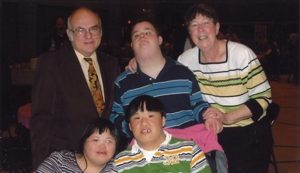 By the time our son Stephen turned seven, we were hoping to adopt another child. To our three birth children, Guy (8), Stephen (7), and Matthew (5), we had already added David (3) and Danny, whose Down syndrome no longer seemed remarkable. He had passed the ripe old age of one and, although he was developing more slowly than our four older boys, he was making strides at his own pace. Other than a small PDA (a patent ductus arteriosusa or small hole in his heart) and the croup which scared us all half to death, he was in good shape physically. (The hole eventually closed, and he outgrew the croup, thank God!) Except for the time I fed him too many carrots and turned his skin orange, we were doing a pretty good job of parenting. Danny had grown into being just another member of the family, and we felt that we could care for one more baby with special needs. Down syndrome did not seem like a disability. It was a challenge which early intervention services helped us to meet.
By the time our son Stephen turned seven, we were hoping to adopt another child. To our three birth children, Guy (8), Stephen (7), and Matthew (5), we had already added David (3) and Danny, whose Down syndrome no longer seemed remarkable. He had passed the ripe old age of one and, although he was developing more slowly than our four older boys, he was making strides at his own pace. Other than a small PDA (a patent ductus arteriosusa or small hole in his heart) and the croup which scared us all half to death, he was in good shape physically. (The hole eventually closed, and he outgrew the croup, thank God!) Except for the time I fed him too many carrots and turned his skin orange, we were doing a pretty good job of parenting. Danny had grown into being just another member of the family, and we felt that we could care for one more baby with special needs. Down syndrome did not seem like a disability. It was a challenge which early intervention services helped us to meet.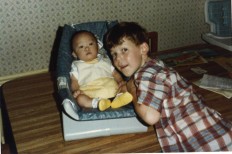
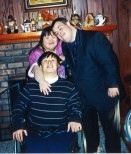
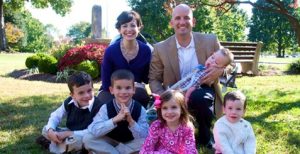 In the fall of 2011, my husband Patrick and I had been married eight years and our family was rapidly growing. Our oldest child had just turned six and we were expecting our fifth child in December. John Paul was born on December 6, 2011. We knew immediately that something was very wrong. The delivery itself was traumatic, during which his arm was broken. When he was finally delivered, he didn’t make a sound. He couldn’t breathe. He was barely moving. He was whisked away to the neonatal intensive care unit. In the days and weeks that followed, we gradually started to understand the severity of John Paul’s condition. When he was 5 weeks old, he was diagnosed with Spinal Muscular Atrophy (SMA). We learned that SMA was a genetic, progressive and terminal neuromuscular disorder. Gradually, every muscle in John Paul’s body would weaken and eventually waste away. Usually death is caused by complications from a common cold because of respiratory weakness. You can imagine how we felt being told that our son would die from complications of a common cold, knowing that we had four children at home, several of whom were not yet adept at covering their mouth and nose when they sneezed or coughed.
In the fall of 2011, my husband Patrick and I had been married eight years and our family was rapidly growing. Our oldest child had just turned six and we were expecting our fifth child in December. John Paul was born on December 6, 2011. We knew immediately that something was very wrong. The delivery itself was traumatic, during which his arm was broken. When he was finally delivered, he didn’t make a sound. He couldn’t breathe. He was barely moving. He was whisked away to the neonatal intensive care unit. In the days and weeks that followed, we gradually started to understand the severity of John Paul’s condition. When he was 5 weeks old, he was diagnosed with Spinal Muscular Atrophy (SMA). We learned that SMA was a genetic, progressive and terminal neuromuscular disorder. Gradually, every muscle in John Paul’s body would weaken and eventually waste away. Usually death is caused by complications from a common cold because of respiratory weakness. You can imagine how we felt being told that our son would die from complications of a common cold, knowing that we had four children at home, several of whom were not yet adept at covering their mouth and nose when they sneezed or coughed.
